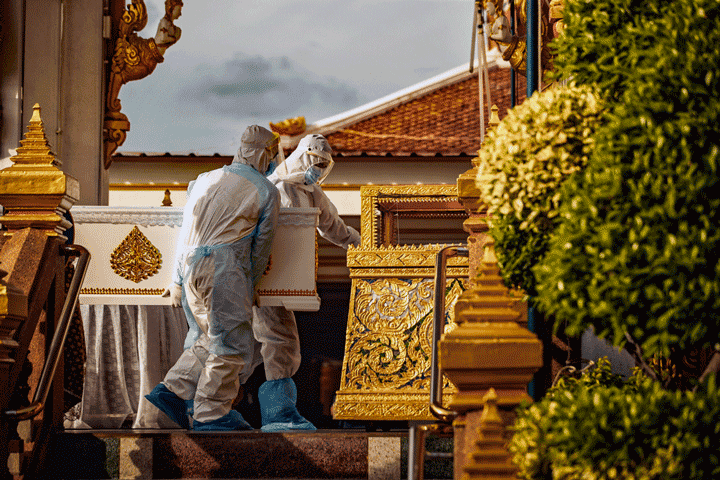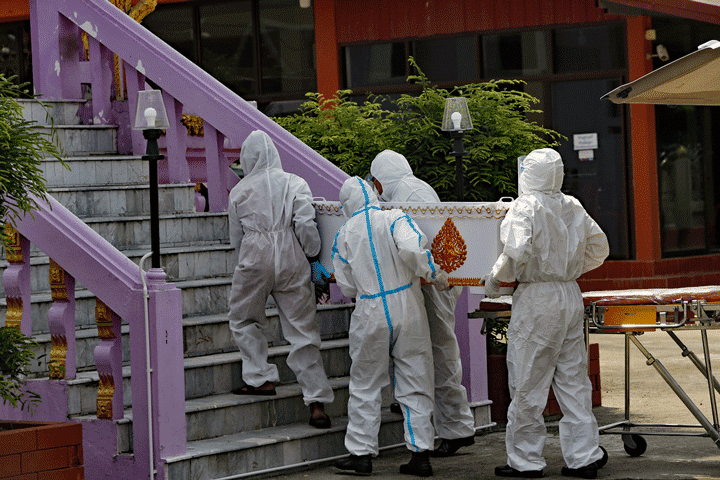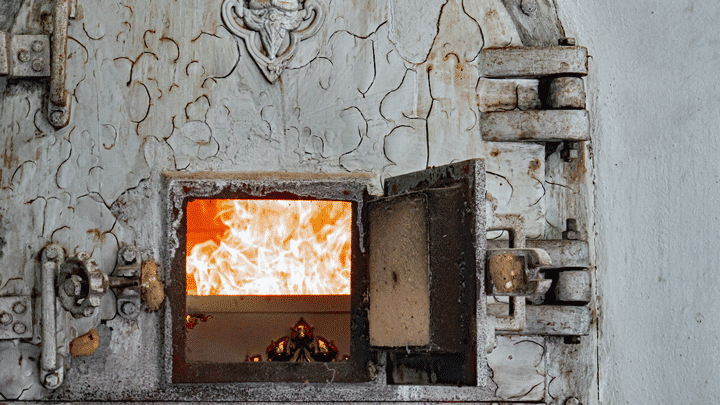Working as a Funeral Worker in Thai Pandemic

(Ekachai prasertkaew / Shutterstock.com)
Sadness, unpleasant odors and an unsafe work environment - these are just some of the factors that contribute to the unattractive job of a funeral director. It will probably discourage many people from taking such a job. But for 47-year-old Saiyon Kongpradit, it's a rewarding job that allows him to help families through the toughest times of their lives.
“I always feel fulfilled when I help families with their grief. Money can't buy the response you get from them when you've made them feel supported.”
Saiyon has been working as a funeral home attendant at Wat Saphan in Bangkok's Klongtoey district for over 10 years. Saiyon was ordained a Buddhist monk at the age of 21 and studied Buddhist teachings at Wat Saphan for 10 years. He then left the monkhood to work in the shipping industry. But he soon discovered that the job did not suit him and decided to become a funeral director. He now leads a temple funeral team of six.
“For me, a funeral assistant is not a job, it's a way of life. I have always wanted to live a simple and peaceful life. I want to help people in need, especially those in the Klongtoey community who are usually underserved. We are family. It also allows me to use my monastic experience and my Dharma teachings to create a safe environment where families feel comfortable dealing with grief.”
He added that the task of dealing with death is more about the living than the dead. In addition to preparing the corpse, cleaning and dressing a loved one so that the next of kin can visit, then taking the body to the cremation chamber, his unit also arranges funeral formalities and checks the paperwork, which authorizes the cremation.
“There is a smell of decomposition,” he says, thinking about the preparation of the body. “But most of our work is dealing with the family of the deceased, not the corpse. We sit down with them to find out what they want for their loved ones' funeral services. We keep in touch with them throughout the ceremony to make sure they don't have any questions running in their heads.”
Saiyan says it's hard to deal with people's emotions, especially when a grieving family is so upset they can't think straight. “We sympathize with them in the loss of a loved one. We understand it's a difficult time. Death is an integral part of life. We comfort them and urge them to support each other and remember the deceased. Our team is always ready to help them through this difficult time,” he says.

(Chaiwat Subprasom / Shutterstock.com)
Dealing with so many final goodbyes
When asked about the hardest days he and his team members have endured, Saiyan says every day at the height of the Covid-19 pandemic was tough. The surge in coronavirus deaths between July and August put enormous pressure on them. Before the pandemic, the temple crematorium was averaging 20 deaths per month, compared to 73 Covid-19 victims in July and 97 in August.
To handle the bodies of Covid-19 victims, the team must wear additional personal protective equipment (PPE), such as masks and protective suits.
Tiresome but satisfying
Danai Sumhirun, 22, another member of the temple's funeral service, says the increased workload the team faced exhausted them. They could hardly cope with the rising number of deaths. “July and August were really bad,” he says.
Danai says the worst day his team experienced during the pandemic was transferring the body of a Covid-19 victim weighing about 200 kilograms to the cremation chamber. “It was extremely tough. Fortunately, it just fit in the cremation chamber. It took about three hours for the body to be properly cremated. We were concerned that the room wouldn't make it due to overuse,” he says, adding that the normal time frame for an average body to be cremated in the room varies between 90 minutes and two hours.
The pressure is further increased by the rules that crematoria have. Danai says wearing personal protective equipment has changed his working life. Although essential, the equipment can make working very difficult. “It is extremely unpleasant. It gets very hot. When I talk to my teammates, the mask makes me a little short of breath. And it is almost unbearably hot when I take care of the oven so that the fire digests the body well,” he explains.
He adds that cremation work can be dangerous as the bodies of Covid-19 victims are wrapped in a white bag that is not opened by the enterprise team. “We never know what's in the bag. I once found the burnt circuit board of a mobile phone when collecting the remains. The device that comes with the body can explode when exposed to extreme heat and pressure during the cremation process. And that can damage lives and property,” says Danai.
He urges the family or next of kin of the deceased to have a doctor remove any medical device, such as a pacemaker, from the body and not to pocket cell phones or other devices.
Saiyon says that Covid cremation services that Wat Saphan is providing are not limited to the families of the deceased living in Klongtoey district. His team has also helped families living far away in provinces such as Pathum Thani and Chachoengsao.

“I could feel the pain of people's voices calling me asking for help in providing Ujit services for their loved ones as many temples refused to take in people who died from the Covid-19. “We worked nonstop as our neighborhood was one of the hardest hit areas during the most recent wave. Sometimes we thought we couldn't go on. We helped as many people as possible, even when we felt we couldn't help them," says Saiyon.
He narrates another special case when the dead body of a loved one from the Rangsit area of Pathum Thani was taken to the temple for cremation. The funeral took place at about one o'clock in the morning.
“The family of the deceased could not attend the funeral because they were sick with the corona virus. We live-streamed the funeral so they could attend virtually. The pandemic has made saying goodbye painfully lonely. We are proud of our role as service providers of last resort,” said Saiyon.
Wat Saphan is one of the temples in Bangkok offering free cremation services to families of those who succumbed to Covid-19
Source: abbreviated translation of https://www.thaipbsworld.com/life-as-a-last-responder-in-a-pandemic


Thank you for making this story accessible to us, Gringo. These funeral staff must have been through a lot, all appreciation for that.